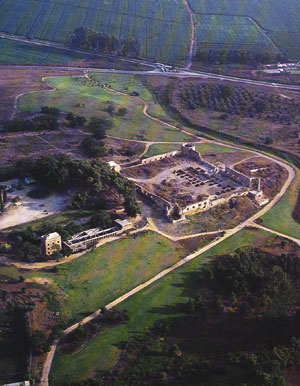HOME / Table of Contents = Civilizations - Cultures - Areas - Regions - Prehistory
Other Archaeological Sites / The Neolithic of the Levant (500 Page Book Online)
Ancient Ras Ain (Head of the Spring) / Canaanite Aphek
Roman Antipatris / Arabic Afek / Modern Rosh Ha'ayin


 From the second millenium BC onwards Aphek-Antipatris is mentioned in ancient written sources. Situated at the headwaters of the Yarkon River its strategic position at the bottle-neck through which passed all routes linking the major powers of the Ancient Near East led to the growth of flourishing cities at Tel Aphek (formerly known as Ras Ain). Almost continuous habitation from the Chalcolithic to Ottoman periods produced a 12 hectare mound standing 15 metres above its surroundings. Sparse remains of the first fortified city dated to the Early Bronze I were found but more extensive areas of the Middle Bronze Age layers were exposed. Analysis of the stratigraphy together with the ceramic typology clarified the phasing of the Middle Bronze IIA in the Levant
From the second millenium BC onwards Aphek-Antipatris is mentioned in ancient written sources. Situated at the headwaters of the Yarkon River its strategic position at the bottle-neck through which passed all routes linking the major powers of the Ancient Near East led to the growth of flourishing cities at Tel Aphek (formerly known as Ras Ain). Almost continuous habitation from the Chalcolithic to Ottoman periods produced a 12 hectare mound standing 15 metres above its surroundings. Sparse remains of the first fortified city dated to the Early Bronze I were found but more extensive areas of the Middle Bronze Age layers were exposed. Analysis of the stratigraphy together with the ceramic typology clarified the phasing of the Middle Bronze IIA in the Levant
Aphek was a Canaanite royal city. Conquered by Joshua it became a Philistine stronghold in the period of the Judges. Its importance is attested by its mention among the cities conquered by the Pharaohs Thutmose III and Amenhotep II. Much later in the 1st century BC the city of Antipatris was built on the site by King Herod the Great ...
The History of the Ancient Near East Electronic Compendium

